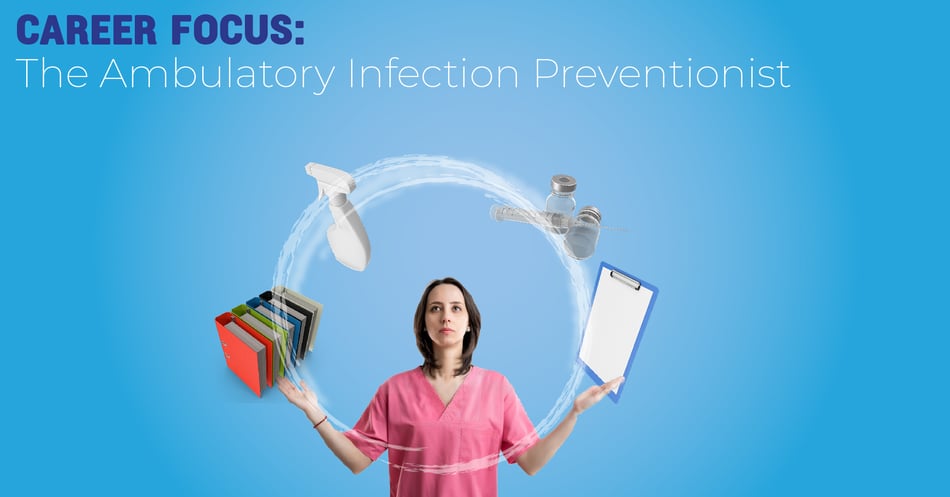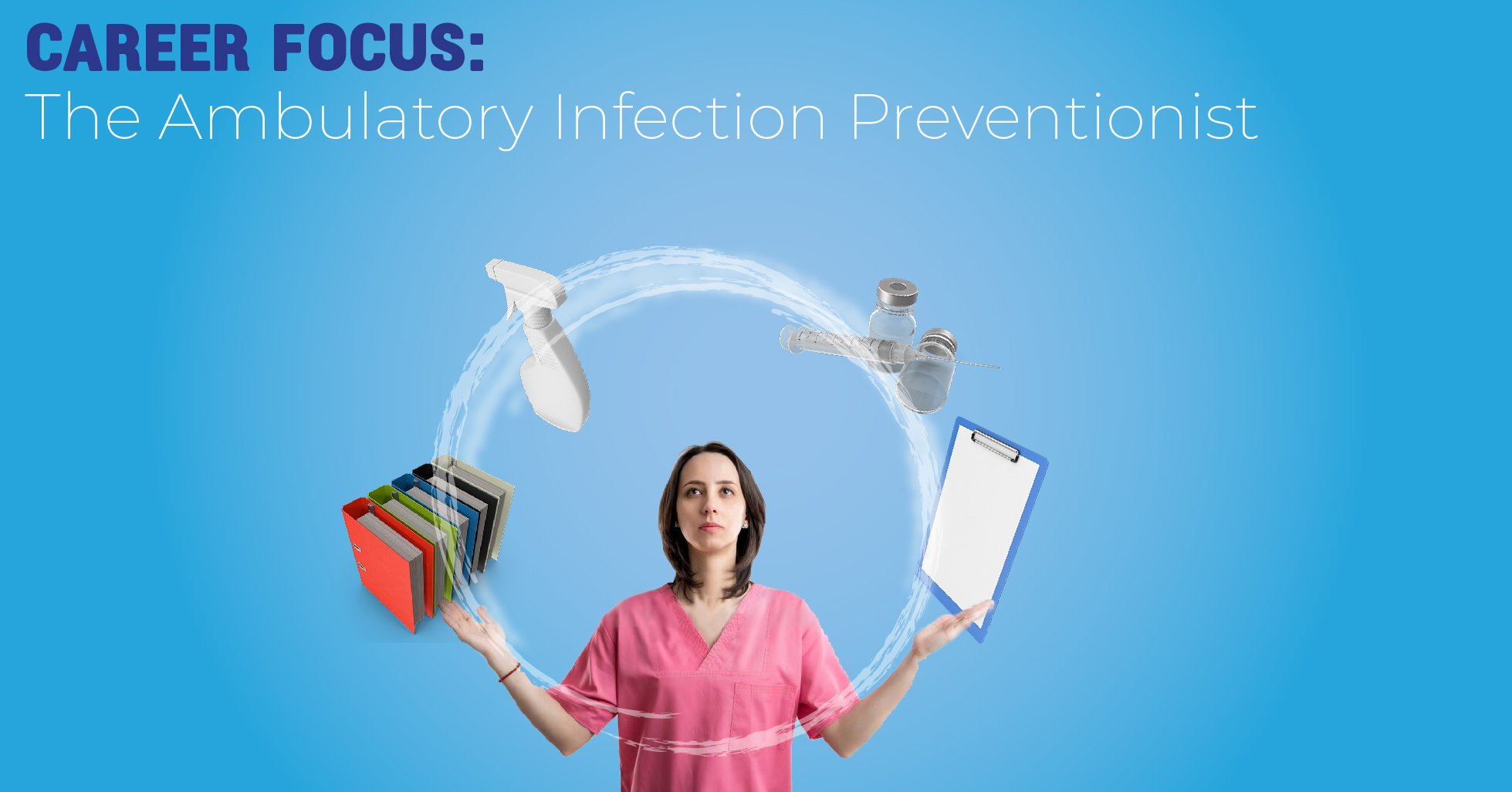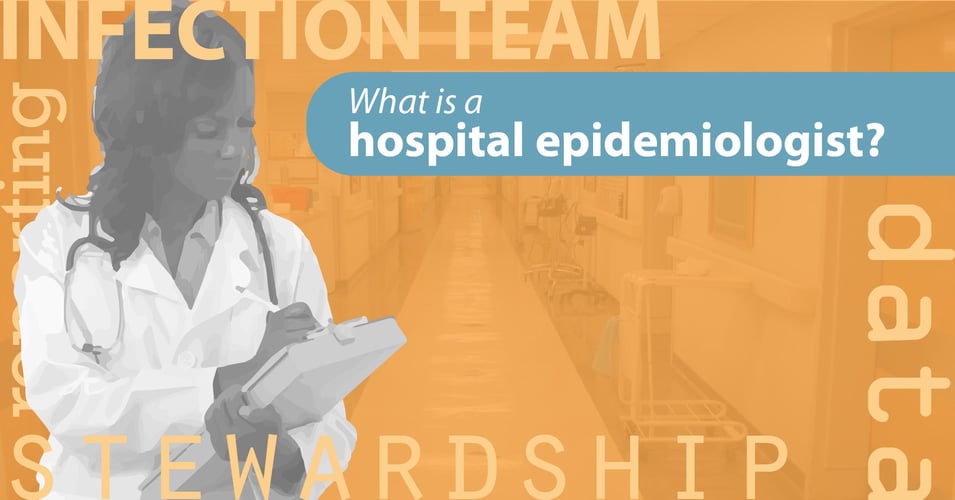Career Focus: Ambulatory Infection Preventionist

 Ambulatory health care facilities, such as outpatient surgery and diagnostic centers, face new regulations requiring the active presence of an infection preventionist. These ambulatory infection preventionists often are responsible for more than one location, large number of staff, as well as reporting duties to both their corporate headquarters as well as state and federal agencies. With this unique and challenging career come added benefits of regular hours, diverse cases, and a favorable job market. In today's post, we will look closely at the roles and responsibilities of this fast-growing infection prevention profession.
Ambulatory health care facilities, such as outpatient surgery and diagnostic centers, face new regulations requiring the active presence of an infection preventionist. These ambulatory infection preventionists often are responsible for more than one location, large number of staff, as well as reporting duties to both their corporate headquarters as well as state and federal agencies. With this unique and challenging career come added benefits of regular hours, diverse cases, and a favorable job market. In today's post, we will look closely at the roles and responsibilities of this fast-growing infection prevention profession.
Ambulatory care is a fast-growing segment of the healthcare marketplace. As hospitals move to relocate outpatient care to satellite locations, as well as the growing investment in healthcare by hedge funds, the growth of outpatient facilities is estimated to be 15% by 2028. Ambulatory care includes familiar locations such as doctor's offices as well as hospital outpatient departments, but it also includes outpatient surgery centers, specialty clinics, dialysis or infusion centers, and urgent care clinics. All these locations employ nurses, but typically, only surgical and dialysis centers require a dedicated infection preventionist to be on staff.
The roles and responsibilities of this dedicated infection preventionist (IP) fall into five categories:
1. Program Development, Implementation and Maintenance | You can't prevent infections if you don't have an infection prevention plan, so one of the most important jobs of the ambulatory IP is the performing an infection risk assessment and creating an infection prevention program. This includes using state and national guidelines, updating the program as regulations change, and adjusting his or her job responsibilities to fit the needs of the facility.
2. Education and Training | Even the best infection prevention plan is useless if the staff are not trained in how to implement it! The ambulatory IP is often tasked with creating and implementing the training program for current and new staff, from environmental services to physicians. This training is both broad (hand hygiene, disinfection) and specific to the facility (aseptic technique, surgical hand antisepsis, sharps safety, infection safety, etc.). Part of training is also educating staff about reporting and interpretation of results so that they understand how the data provides feedback.
3. Surveillance, Data Collection and Analysis | You don't know how effective your program and training are unless you collect data (and regulations now require it in some cases). Data collection starts with diagnosed infections and infections reported by patients after discharge, but it also includes going after the data by making follow-up calls to patients and referring physicians, surveys, and other metrics. Internal auditing also provides helpful data, so the ambulatory IP will need to conduct observations of hand hygiene, injection practices, and use of PPE. In some cases, the ambulatory IP will draw up auditing procedures for pre- and post-surgery care, environmental surveys for air quality or surface contamination, and equipment upkeep. This data feeds back into step 1 in a continuous loop. Finally, the IP may also have to report specific data to CMS or state health departments.
4. Infection Prevention Strategies | So now that the plan is in place, what are the day-to-day strategies that the staff need to employ to keep patients safe? The ambulatory IP will ensure that each strategy has clear and concise steps, from how to wash hands to how to physically handle a patient with a surgical incision. Each facility will need strategies unique to the services they provide, but all IPs will need to create strategies for environmental services, ensure that documentation and classification is consistent, and that equipment is handled appropriately.
5. Instrument and Equipment Cleaning, Disinfection and Sterilization | Everything in an ambulatory care center must be as free from contamination as possible, including equipment. The ambulatory IP must be up-to-date on the standards and guidelines for cleaning, disinfecting and sterilizing the many pieces of instrumentation and equipment in the facility and ensure that those responsible for upkeep are following those requirements. One of the most important examples of this is endoscopy equipment, as endoscopies are common procedures with an elevated risk of infection. The IP must update the cleaning procedures, monitor their implementation, and provide constant feedback to staff about areas for improvement. As the expert on infection prevention, the ambulatory IP may also have a voice in selecting and updating current equipment and instruments in order to improve patient safety.
With this enormous list of responsibilities, you may be wondering who on Earth would want to take on this challenge. And yet (thankfully), thousands of dedicated professionals, many trained as nurses with additional experience in hospital infection control, take on the challenge every day. This career allows a healthcare professional to oversee infection prevention at every level, taking on the responsibility, but also the satisfaction, of keeping patients safe and healthy.
![EOScu Logo - Dark - Outlined [07182023]-01](https://blog.eoscu.com/hubfs/Eoscu_June2024/Images/EOScu%20Logo%20-%20Dark%20-%20Outlined%20%5B07182023%5D-01.svg)




